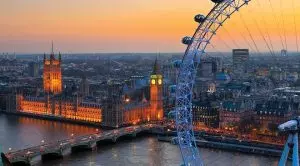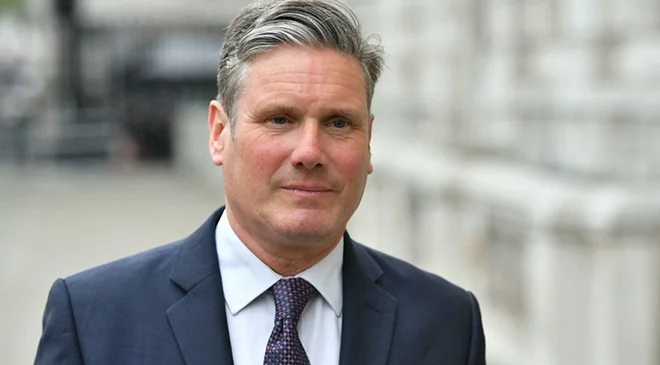 As a consequence of the Labour Party’s devastating results in the General Elections in 2019, Jeremy Corbyn voluntarily withdrew from the leadership position, which triggered the elections for a new party leader. Sir Keir Starmer has been occupying the post since April 2020. Winning the Opposition’s leadership contest with 56.2% of the vote in the first round, he defeated the other two contenders, Rebecca Long-Bailey and Lisa Nandy.
As a consequence of the Labour Party’s devastating results in the General Elections in 2019, Jeremy Corbyn voluntarily withdrew from the leadership position, which triggered the elections for a new party leader. Sir Keir Starmer has been occupying the post since April 2020. Winning the Opposition’s leadership contest with 56.2% of the vote in the first round, he defeated the other two contenders, Rebecca Long-Bailey and Lisa Nandy.
Commenting on his victory, Starmer highlighted that “It is the honour and privilege of his life to be elected as leader of the Labour Party”, especially considering the gravity of the unprecedented health crisis caused by the Corona Virus outbreak.
Before he was elected a Labour Party leader, he was Shadow Minister for Immigration from 2015 to 2016 and Shadow Secretary of State for Exiting the European Union from 2016 to 2020. He has also been MP for Holborn and St Pancras since 2015.
Starmer’s political career was preceded by 5 years as Director of Public Prosecutions. Although not a supporter of Brexit, once it was a fact, he advocated a smooth transition into the new circumstances.
Taking into account the unprecedented health crisis, Starmer confirmed that it would be among his priorities as a Labour Party leader to “engage constructively with the government, not opposition for opposition’s sake”. The question remains whether he has succeeded in offering constructive criticism while cooperating with the government.
The current publication concentrates on the Labour Party’s current leadership position, as well as the odds of a potential replacement and the possible successors.
What Has Knocked Sir Keir Starmer’s Authority?
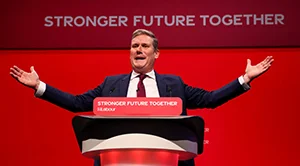 Born in a family of Labour Party supporters, Keir Starmer was named after Keir Hardie, who is the founder of the Labour Party and its first parliamentary leader. Starmer was educated at Reigate Grammar School and later studied law at the University of Leeds. Subsequently, he engaged in postgraduate studies and graduated from the University of Oxford as a Bachelor of Civil Law.
Born in a family of Labour Party supporters, Keir Starmer was named after Keir Hardie, who is the founder of the Labour Party and its first parliamentary leader. Starmer was educated at Reigate Grammar School and later studied law at the University of Leeds. Subsequently, he engaged in postgraduate studies and graduated from the University of Oxford as a Bachelor of Civil Law.
His legal career started as a barrister at the Honourable Society of the Middle Temple. In the 1990s he was primarily involved in human rights issues. At the age of 39, he was appointed Queen’s Counsel. In 2008, Starmer became the new Head of the Crown Prosecution Office, a position he held until 2013. The former Head publicly shared his approval of his successor.
Lack of Constructive Criticism and a Clear Policy
In the wake of the Conservative Party’s handling of the Covid-19 crisis, Starmer claimed that the latter was “too slow to enter the lockdown” and openly criticised Boris Johnson over a series of moves.
Starmer’s term of office is significantly marked by his outright opposition to some of the Conservative Party’s policies related to the Covid-19 pandemic measures, as well as his desire to distinguish from the leadership approach of the former Labour Party leader, Jeremy Corbyn.
Starmer’s Proposal to Go Back to the Electoral College System
Driven by his desire to change the way Labour leaders are chosen, Sir Keir Starmer has voiced his desire to return to the electoral way of voting used before Jeremy Corbyn’s term of office. What the leader proposed was replacing the one member, one vote system (OMOV) with the electoral college system of voting.
The latter involves the participation of trade unions and affiliate organisations, MPs, and party members. Conversely, the OMOV system dictates selecting party leaders by a direct vote of the party members.
Supporters of the OMOV system claimed that it is the most democratic way of electing a party leader, adding that democracy within the party should be observed. As a result of the electoral college system’s rejection by the Labour Party’s left-wing, Starmer was forced to abandon his plans.
Another reform that Keir Starmer supported was changing the way parliamentary candidates are reselected. In his multiple statements, he emphasized that internal reforms within the party are needed so that it is better connected with the working people of the United Kingdom.
The Larger Context
Looking at the bigger picture, the Labour Party has been out of power since 2010. Despite the Conservative Party’s flaws, the Opposition failed to deliver a better alternative. At the General Elections conducted in 2019, the Labour party has suffered dreadful results and Keir Starmer’s election as a new Party leader was embraced as a chance to launch a new era.
Ever since the Brexit campaign of 2016 and as elections indicated, the Labor Party continued to suffer from electoral distrust, which ultimately resulted in losing many voters. Supporters of Starmer claim that he was additionally hindered by the health crisis.
The Incident on February 07, 2022, near Parliament
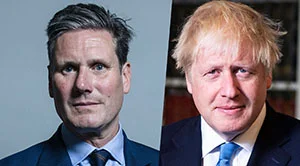 In the wake of the Partygate scandal, Starmer has given a poignant speech at Parliament, commenting on the series of rule-breaking gatherings held at 10 Downing Street, during times of austere Covid-19 restrictions.
In the wake of the Partygate scandal, Starmer has given a poignant speech at Parliament, commenting on the series of rule-breaking gatherings held at 10 Downing Street, during times of austere Covid-19 restrictions.
The Labour Party leader commented on the “heart-wrenching sacrifices” to which the British society was subjected, and the total inappropriateness of the outrageous gatherings. Starmer addressed Boris Johnson, stating that the latter “showed himself unfit for office”.
Criticism did not lack on Boris Johnson’s behalf as well, claiming that Starmer has failed to prosecute serial sex offender Jimmy Savile when the Labour Party’s leader was Head of the Crown Prosecution Office in 2009.
Later on, the Conservative Party leader tried to mitigate the impact of his ungrounded claim, but in vain, as its aftermath included the resignation of Downing Street’s head of policy, Munira Mirza.
After 14 years of loyal service to Boris Johnson, she was obviously struck by this slur, making an emotional statement, as part of her resignation letter: “You are a better man than many of your detractors will ever understand, which is why it is so desperately sad that you let yourself down by making a scurrilous accusation against the leader of the opposition.” The lack of an outright apology from Johnson was what ultimately triggered the top aide’s exit.
In a 254-word parting shot, Munira Mirza – widely known as "Boris’s brain" – explained her reasons for resigning.
Mr Johnson's Jimmy Savile jibe at Sir Keir Starmer, the Labour leader, was "inappropriate and partisan", she wrote pic.twitter.com/6K8bZly7vq
— Telegraph Politics (@TelePolitics) February 4, 2022
However, Munira Mirza’s resignation was not the only consequence of the ungrounded slur. On February 07, 2022, the Labour Party’s leader was harassed by a group of angry demonstrators shouting “traitor” and “Jimmy Savile”. Starmer, along with Shadow Foreign Secretary, David Lammy, had to be crammed into a police car.
Many saw this act as the result of Boris Johnson’s false claims regarding the Savile case. In response to the incident, Johnson commented that “The behaviour directed at the Leader of the Opposition” was “absolutely disgraceful”, but did not offer his excuses.
As per the latest interviews with Keir Starmer, he has confirmed that he has received death threats following Boris Johnson’s remarks on the Savile case.
What happened to Keir Starmer tonight outside parliament is appalling. It is really important for our democracy & for his security that the false Savile slurs made against him are withdrawn in full.
— Julian Smith MP (@JulianSmithUK) February 7, 2022
What Is the Public Opinion of the Labour Party’s Leader?
 An online survey conducted by YouGov indicates the public opinion of Keir Starmer and his handling of the position of a Labour Party leader. As the research suggests, the rating of the politician has been fluctuating from May 2020 through to January 2022. Ultimately, a general downfall is obvious.
An online survey conducted by YouGov indicates the public opinion of Keir Starmer and his handling of the position of a Labour Party leader. As the research suggests, the rating of the politician has been fluctuating from May 2020 through to January 2022. Ultimately, a general downfall is obvious.
When asked if Keir Starmer is doing well as a Labour leader, some 39% of the respondents answered “well” back in May 2020, compared to 29% of the same opinion in January 2022. As for the respondents of the polar opinion, a total of 17% answered “badly” in May 2020, whereas this portion has risen to 52% in January 2022.
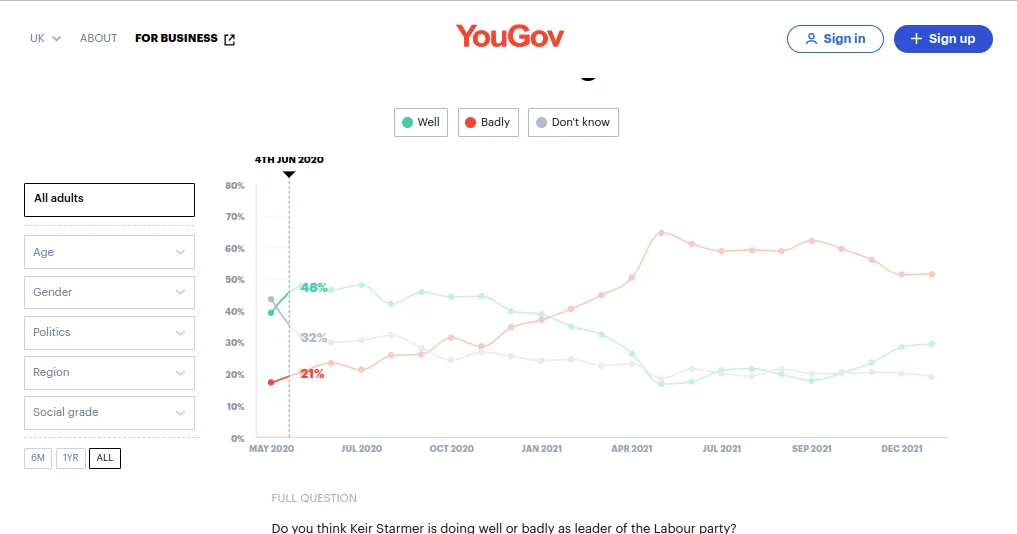
Betting Markets Available on Interactive Bookmakers
 Online sports betting operators have found a way to garner the interest of politically-engaged punters by offering diverse betting markets on trending political topics. “When will the Labour Party’s leader be replaced?” and “Who will replace the Labour Party leader?” are currently among the political betting markets that can be found in the portfolio of many interactive bookmakers.
Online sports betting operators have found a way to garner the interest of politically-engaged punters by offering diverse betting markets on trending political topics. “When will the Labour Party’s leader be replaced?” and “Who will replace the Labour Party leader?” are currently among the political betting markets that can be found in the portfolio of many interactive bookmakers.
When Will Keir Starmer Be Replaced as a Labour Party Leader?
As far as Keir Starmer’s potential replacement as a Labour Party leader is concerned, online sportsbooks are presenting punters with different options. As the table indicates, bookies are offering timeframes ranging from 2022 to 2025, or later.
It turns out that most of the bettors engrossed in politics will place their bets on Keir Starmer to be replaced as Labour Party leader in 2024 or later.
| Sky Bet | William Hill | Coral | Betfred | Ladbrokes | |
|---|---|---|---|---|---|
| 2022 | 7 | – | 10 | 8 | 10 |
| 2023 | 5/2 | – | 5/2 | 5/2 | 5/2 |
| 2023 or earlier | – | 2 | – | – | – |
| 2024 | – | 6/4 | – | – | – |
| 2024 or later | 4/9 | – | 2/5 | 2/5 | – |
| 2025 or later | – | 13/8 | – | – | – |
*Odds are valid as of the day of writing the report
Who Will Replace Keir Starmer as a Labour Party Leader?
Many online bookies are offering odds on the possible successors of Keir Starmer. You can have a look at the leading 5 Labour party politicians, ranked as favourites to replace the current leader.
Andy Burnham
 Andrew Murray Burnham is a British Labour and Co-operative Party politician, who has been serving as Mayor of Greater Manchester since 2017. He has been reselected in May 2021. Before his mayoral position, he was MP for Leigh from 2001 to 2017. Under Gordon Brown’s term of office, he was Chief Secretary to the Treasury, Culture Secretary, and Health Secretary. In the role of a Health Secretary, he stood against the further privatisation of the NHS services.
Andrew Murray Burnham is a British Labour and Co-operative Party politician, who has been serving as Mayor of Greater Manchester since 2017. He has been reselected in May 2021. Before his mayoral position, he was MP for Leigh from 2001 to 2017. Under Gordon Brown’s term of office, he was Chief Secretary to the Treasury, Culture Secretary, and Health Secretary. In the role of a Health Secretary, he stood against the further privatisation of the NHS services.
He has also been Shadow Education Secretary, Shadow Health Secretary, and Shadow Home Secretary. After the Labour Party’s defeat in the General Elections in 2010, he was a candidate for a Party leader but finished fourth out of five candidates. Following the repeated party’s defeat during the 2015 General Elections, he was once again participating in the leadership contest but finished a runner-up to Jeremy Corbyn.
Rachel Reeves
 Rachel Jane Reeves is yet another potential successor of Keir Starmer. She has been serving as MP for Leeds West since 2010 and as Shadow Chancellor of the Exchequer since 2021. After Keir Starmer’s election for Labour Party leader in 2020, he appointed Reeves as Shadow Chancellor of the Duchy of Lancaster and Shadow Minister for the Cabinet Office.
Rachel Jane Reeves is yet another potential successor of Keir Starmer. She has been serving as MP for Leeds West since 2010 and as Shadow Chancellor of the Exchequer since 2021. After Keir Starmer’s election for Labour Party leader in 2020, he appointed Reeves as Shadow Chancellor of the Duchy of Lancaster and Shadow Minister for the Cabinet Office.
Reeves has authored several books including Women of Westminster: The MPs Who Changed Politics, and Alice in Westminster: The Political Life of Alice Bacon. In an interview from December 2021, the Shadow Chancellor has expressed a positive opinion that the Labour Party was at its best for the last decade. She also acknowledged that the party has a long way to go until it resumes its electorate trust.
Angela Rayner
 Angela Rayner is the current Deputy Leader of the Labour Party. She is the Labour MP for Ashton-under Lyne, and currently assumes the position of Shadow Minister for the Cabinet Office, Shadow Chancellor of the Duchy of Lancaster and Shadow Secretary of State for the Future of Work. She is a supporter of the labour’s soft left. Back in the 2020 Labour Party leadership election, Angela Rayner chose not to participate in the contest. Instead, she endorsed Keir Starmer’s opponent, Rebecca Long-Bailey.
Angela Rayner is the current Deputy Leader of the Labour Party. She is the Labour MP for Ashton-under Lyne, and currently assumes the position of Shadow Minister for the Cabinet Office, Shadow Chancellor of the Duchy of Lancaster and Shadow Secretary of State for the Future of Work. She is a supporter of the labour’s soft left. Back in the 2020 Labour Party leadership election, Angela Rayner chose not to participate in the contest. Instead, she endorsed Keir Starmer’s opponent, Rebecca Long-Bailey.
As for her stance on Jeremy Corbyn’s policy and leadership, she has commented that he has a “more international view of things”, whereas she is “more pragmatic” and involved in the things that matter to ordinary people.
She expressed her opinion over the Downing Street Parties, stating that the Prime Minister “can run but he cannot hide”.
Lisa Nandy
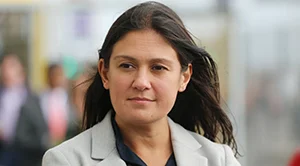 Lisa Eva Nandy was among the candidates at the 2020 Labour Party leader elections and finished third behind Keir Starmer and Rebecca Long-Bailey. During the Shadow Cabinet reshuffle initiated by Keir Starmer in 2021, Lisa Nandy was appointed Shadow Secretary of State for Levelling up, Housing, Communities and Local Government.
Lisa Eva Nandy was among the candidates at the 2020 Labour Party leader elections and finished third behind Keir Starmer and Rebecca Long-Bailey. During the Shadow Cabinet reshuffle initiated by Keir Starmer in 2021, Lisa Nandy was appointed Shadow Secretary of State for Levelling up, Housing, Communities and Local Government.
During Corbyn’s tenure, Nandy was appointed a Shadow Secretary of State for Energy and Climate Change. She occupied this position until 2016 when she resigned protesting to Corbyn’s policy.
Although in her early forties, according to some, Lisa Nandy is well-suited to become a Labour Party leader.
Wes Streeting
 Wesley Paul William Streeting currently serves as the Shadow Secretary of State for Health and Social Care. Having a well-presented personality and the gift of an orator, able to attract the attention even of small children, he is seen by many as the future leader of the Labour Party.
Wesley Paul William Streeting currently serves as the Shadow Secretary of State for Health and Social Care. Having a well-presented personality and the gift of an orator, able to attract the attention even of small children, he is seen by many as the future leader of the Labour Party.
In an interview regarding Partygate and the universal anger up and down the country, Wes Streeting comments on the Labour party’s position amid the scandal. The moment is exclusively important for the Labour Party, as according to polls, it has had its biggest lead since 2014. When asked about the current political situation, he highlighted the importance of winning back the trust of the nation.
Among the other Labour Party potential successors of Keir Starmer are Yvette Cooper, Bridget Phillipson, Sadiq Khan, Jess Phillips, and Dan Jarvis. Punters interested in political betting might have a look at the table below, indicating the odds for the current top 10 pretenders for the leadership position.
| Bet365 | Paddypower | William Hill | Betfair | Betvictor | Coral | Unibet | MansionBet | Betfred | Ladbrokes | |
|---|---|---|---|---|---|---|---|---|---|---|
| Andy Burnham | 3 | 9/4 | 3 | 9/4 | 11/4 | 10/3 | 3 | 3 | 3 | 10/3 |
| Rachel Reeves | 6 | 7 | 13/2 | 7 | 8 | 8 | – | 13/2 | 7 | 8 |
| Angela Rayner | 7 | 9/2 | 8 | 9/2 | 7 | 8 | 13/2 | 7 | 10 | 8 |
| Lisa Nandy | 9 | 6 | 8 | 6 | 9 | 10 | 6 | 8 | 8 | 10 |
| Wes Streeting | 14 | – | 9 | – | 10 | 8 | – | 14 | 12 | 8 |
| Yvette Cooper | 9 | 12 | 12 | 12 | 8 | 12 | 12 | 10 | 10 | 12 |
| Bridget Phillipson | 14 | 25 | 12 | 25 | 25 | 16 | – | 16 | 16 | 16 |
| Sadiq Khan | 25 | 8 | 25 | 8 | 20 | 20 | 14 | 16 | 25 | 20 |
| Jess Phillips | 28 | – | 25 | – | 16 | 33 | 33 | 28 | 33 | 33 |
| Dan Jarvis | 28 | 33 | 33 | 33 | 28 | 33 | 33 | 28 | 33 | 33 |
*Odds are valid as of the day of writing the report
Conclusion
Keir Starmer’s critics do not fail to highlight that the Labour party has not enjoyed much progress during his term of office. There is a general disappointment that in spite of the Conservative Party’s weaknesses, the Opposition has not been able to offer a more influential challenge. Furthermore, many believe his lack of popularity among the British population is due to the pandemic’s impact.
While it is undoubtedly difficult for Starmer to influence the constituency during times of an unprecedented health crisis, he has found himself in a situation of being unable to offer a viable agenda.
Despite the Labour Party’s consistent leading position in opinion polls from the beginning of 2022, this success should not be fuelled by Tory’s failures, but by a detailed and clear political vision for the future of the United Kingdom.
- Author
